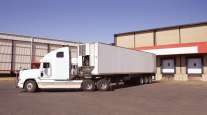Senior Reporter
ATRI Unveils Top Five Research Areas for 2022

[Stay on top of transportation news: Get TTNews in your inbox.]
SCOTTSDALE, Ariz. — The American Transportation Research Institute unveiled its top five research areas for 2022 at American Trucking Associations’ annual Mid-Year Management Conference May 16.
During a wide-ranging panel discussion, ATRI President and Chief Operating Officer Rebecca Brewster said ATRI decided on these items after hearing from the institute’s Research Advisory Committee, which is composed of a cross-section of industry leaders and is charged with recommending a research agenda to ATRI.
The top area for research will be the ongoing issue of marijuana and other drugs and the impact of decriminalization on the trucking industry.
Top Five ATRI Research Areas
- Marijuana: Impacts of Decriminalization on Trucking Industry
- Quantifying Industry Impacts from Predatory Towing
- Efficacy of Driver Training on Safety Outcomes and Driver Retention
- Utilizing EB-3 Work Permits to Help Mitigate the Driver Shortage
- SEC Climate Rule Impacts on the Trucking Industry
“This is actually an update to a study that ATRI released in 2019, where we looked at the growing number of states that decriminalized marijuana,” Brewster told Transport Topics. “We’re looking at the safety impact in those states that have liberalized their laws. We know there are high numbers of drivers who have done a pre-employment screen and they show up in the Drug and Alcohol Clearinghouse, but they do not initiate their return-to-duty process or leave the industry altogether.”
As of April 1, 89,000 of the more than 119,000 drivers who failed at least one drug test have yet to enroll in the return-to-work process. Only about 29,000 have completed the process and are eligible to drive again, and 56% or nearly 71,000 drivers have tested positive for marijuana.
Brewster said the industry does not want unsafe, impaired drivers, but the industry needs some sort of field-sobriety test for marijuana similar to the one in use for many years to judge a driver’s possible alcohol impairment.

Brewster
“Right now, a law enforcement officer can be trained to recognize impairment from other substances, but they do not have a way to confirm that roadside,” she said.
ATRI’s second-highest priority is the impact of predatory towing companies. Maryland Gov. Larry Hogan has before him legislation that would put monetary restrictions on towing companies for police-initiated tows involving trucking companies. Some trucking companies have alleged that towing companies have gouged the trucking industry.
“We have heard from the state trucking associations that they get calls from their members repeatedly that they have been involved in an incident in another state and they don’t have a terminal there or they don’t know anyone locally and the truck is towed away, sometimes by an unscrupulous operator who holds the truck and the cargo for ransom with exorbitant bills,” Brewster said. “We want to look at how extensive this problem is.”
The third area ATRI plans to research involves the efficacy of driver training on safety outcomes and driver retention.
FOR IMMEDIATE RELEASE: #ATRI Board Approves New Research Priorities https://t.co/XATvT9KfDo #TruckingResearch #Trucking — ATRI (@Truck_Research) May 16, 2022
“Now we have an Entry Level Driving Rule in place, and we are going to focus on how impactful that training is for safety outcomes for new entrants and also on how successful we are at equipping new entrants to be successful in this industry from a retention standpoint,” Brewster said.
Brewster said this research will be similar to one that was done in 2008 when ATRI looked at ways the industry can attract and retain drivers.
With the industry needing at least 80,000 drivers to replace older drivers who are retiring or who have changed careers, ATRI’s fourth area of research will deal with utilizing the government’s Employment-Based Immigration: Third Preference (EB-3) program — a visa preference category — for those who want to drive in the United States.
“There are fleets that are successful bringing in drivers from other countries, utilizing these work permits,” Brewster said. “We want to do a deeper dive on that and figure out what’s working for those fleets, how they have made it work. What’s been the experience of those drivers they’ve brought in, because this is just another tool in the toolbox for us as an industry for dealing with the driver shortage.”
The fifth area of research concerns an issue that Brewster believes has been under the radar. It involves proposed new regulations coming from the Securities and Exchange Commission that would require reporting by publicly traded companies on the amount of carbon dioxide (CO2) they emit, to measure climate change.
Want more news? Listen to today's daily briefing above or go here for more info
The proposal is currently in the comment period.
Brewster said there is the potential for a significant trickle-down to the trucking industry.
“There are several levels being proposed and one would go all the way down to everyone that touches those companies,” she said. “If you’re a three-truck operator that delivers for a publicly traded company, whether it’s a shipper or receiver, I may be required to report my CO2 contributions. So, what is the trickle-down impact of this to everyone in the supply chain? There are a lot of unanswered questions that the research will start to investigate.”




